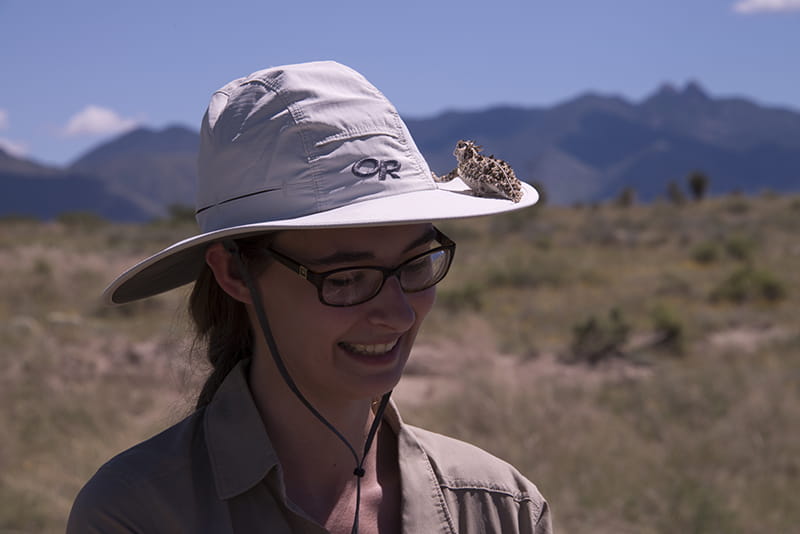PhD Candidate Finds Place for Entomological Research, Teaching Goals to Grow at Drexel

- On the Trail of Deepfakes, Drexel Researchers Identify ‘Fingerprints’ of AI-Generated Video
- New AI-Technology Estimates Brain Age Using Low-Cost EEG Device
- Bolstered by Research Consortium with Drexel, Jefferson’s Sidney Kimmel Cancer Center Earns NCI Comprehensive Cancer Center Designation
- Alyssa Kemp Named as 2024 Truman Scholar

Above photo by Stephen Buchmann.
Second photo by Zachary Smith.
Meghan Barrett is meeting with four rising sophomore students in her lab to help them prepare for their upcoming poster presentations as part of the iSTAR Scholars program, complimenting as much as she is critiquing.
In a mock Q&A, one student asks the presenting student a question that she doesn’t know how to answer, and says as much to her pretend audience.
“That’s the best part about science … there’s so much we don’t know,” Barrett said, encouraging the undergrad’s response.
Though this may be true for Barrett, those who speak with her about her own research and approach to teaching quickly realize that Barrett already knows a lot. Though she just defended her thesis proposal to become a PhD candidate in Drexel University’s Department of Biology within the College of Arts and Sciences, Barrett has already had several meaningful research experiences in the field, multiple publications to her name and has mentored many students in finding a love for her chosen field — entomology.
That’s right, Barrett is a self-proclaimed “bug girl.”
“I describe becoming an entomologist like getting my letter to Hogwarts,” she said. “It opens up this whole magical world around you that nobody else knows exists and suddenly you do. You see them [insects] as you walk down the street and nobody else does. Once I fell in love with insects it was really hard to go back.”
Going down this entomological path wasn’t always where Barrett thought she’d end up. At the start of her undergraduate studies at the State University of New York at Geneseo, she was on the track to medical school.
“As a kid, I really wanted to be a doctor or a nurse. That was my big goal,” she said. “I was fascinated by the brain. I wanted to be a neurosurgeon.”
“As a kid, I really wanted to be a doctor or a nurse. That was my big goal,” she said. “I was fascinated by the brain. I wanted to be a neurosurgeon.”
“I remember thinking, ‘Oh no, not the ant lab!’ because they’re grubby and gross and not exhilarating in any way,” she recalled. “But I very reluctantly put my head down and went to the interview and decided to work in the ant lab for a year just so I'd have some research experience.”
Making this reluctant decision ended up being very much in her favor. She fell in love with the work, and decided to pursue entomological research in graduate school as opposed to going to medical school.
This decision — along with that to specifically enter a graduate program at Drexel — also allowed her pursue her dual passion for teaching through resources offered by the PROFESS program and the Center for the Advancement of STEM Teaching and Learning Excellence (CASTLE). PROFESS enables Drexel graduate students to train in educational methods and earn an additional graduate minor or advanced degree in undergraduate STEM teaching.
“The PROFESS program is what made the decision to come to Drexel super easy,” Barrett said. “[There was] no way I was going to consider any other place because nowhere else I applied prioritizes teaching the way that Drexel does.”
Since coming to Drexel two years ago, Barrett has taught hundreds of students as a teaching assistant and has mentored more than a dozen more in the lab of her principal investigator, Sean O’Donnell, PhD, a professor in the Departments of Biology and Biodiversity, Earth and Environmental Science. Together, they have researched everything from how army ant soldiers and workers differ in brain size to whether or not a compound found in the artificial sweetener Truvia could be used as a human-safe insecticide for ants.
O’Donnell said Barrett is a highly motivated graduate student who is definitely ahead of the game in terms of the things she’s been able to accomplish, organize and pursue this early in her career.
“What impresses me most about her own research program is that she’s very independent,” he said. “She’s not only a great fit for my lab by addressing techniques and asking questions that are related to things in my research program, but she has identified her own study system completely independently.”
“What impresses me most about her own research program is that she’s very independent,” he said. “She’s not only a great fit for my lab by addressing techniques and asking questions that are related to things in my research program, but she has identified her own study system completely independently.”
“Bees are really cute and they’re super diverse – more than 4,000 species exist in the United States alone,” Barrett said. “They come in all sorts of incredible colors. That's what first blew my mind about bees when I really started learning about them. They come in purple and green and pink and gold and rainbow, and some of those bees can be found in our backyards.”
Annette Kang, a fourth-year biological sciences undergraduate student who has worked in the O’Donnell lab with Barrett and has been in classes for which she was the TA, said that Barrett’s passion and interests in entomological studies are contagious.
“It’s really great to meet someone who kind of has that passion and drive, and you see it every day in the work,” Kang said of Barrett.
Kang said that Barrett is the type of teacher who brings a lot of enthusiasm to the classroom, and also tries to figure out how everyone learns and cater to those needs.
“If anyone is really looking for a visionary TA, I think she’s it,” Kang said.
Barrett’s future goal — along with studying plenty more fascinating insects — is to run a small lab of her own where undergraduates like Kang can be empowered to handle their own projects and develop as researchers.
“I would love to — and this is my big-picture goal — whichever department I go to, I hope that I can revolutionize how they choose to teach and mentor,” she said.
Follow along with Barrett and her research on her website.
In This Article
Drexel News is produced by
University Marketing and Communications.
